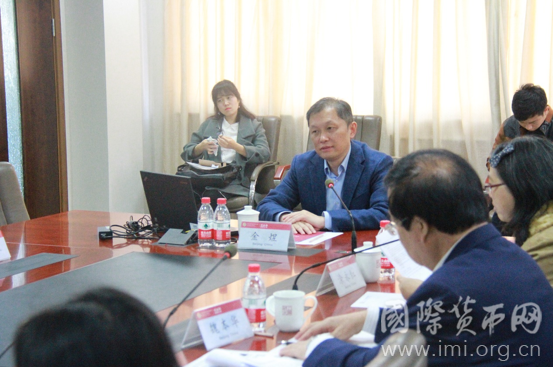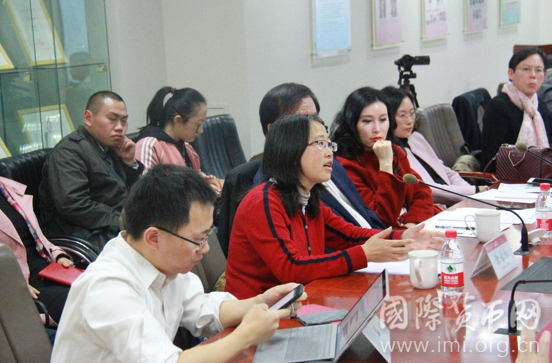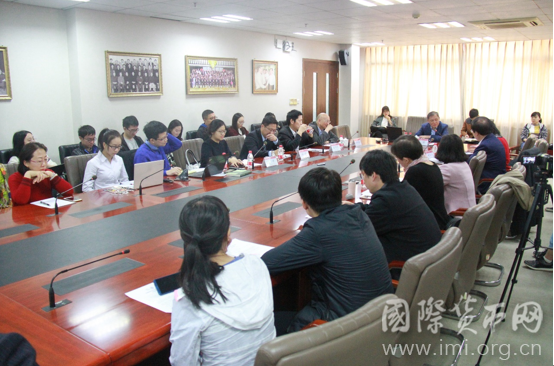Macro-Finance Salon (No. 102): Observation and Reflection on Structural Deleveraging
2018-10-19 IMI Chairman Jin Yu delivered a keynote speech entitled “Observation and Reflection on Structural Deleveraging from the Perspective of Commercial Banks”. He first explained his understanding about structural deleveraging, which was believed to be mainly composed of three components: the non-financial sector, the enterprise sector and the resident sector. The three levers form the macro situation. Since the global financial crisis in 2008, China's macro leverage rate has risen relatively fast. He then analyzed the current performance of structural deleveraging and argued that the performance was divergent. The first divergence was that the leverage ratio of non-financial enterprises has declined, but state-owned enterprises and private enterprises have “diverged”. The second divergence existed in the leveraging of government since the local governments were struggling for it, while the central government did not take any action.
In the end, he noted that, to structurally deleverage, we need strict regulations, moderate monetary policies, loose fiscal policies, and hard reforms. We need to give market mechanisms the fundamental role and accelerate the reform of key areas such as fiscal and taxation, state-owned enterprises, and finance. We also need to strengthen financial infrastructure and open up the mechanism of money and credit transmission.
Chairman Jin Yu delivered a keynote speech entitled “Observation and Reflection on Structural Deleveraging from the Perspective of Commercial Banks”. He first explained his understanding about structural deleveraging, which was believed to be mainly composed of three components: the non-financial sector, the enterprise sector and the resident sector. The three levers form the macro situation. Since the global financial crisis in 2008, China's macro leverage rate has risen relatively fast. He then analyzed the current performance of structural deleveraging and argued that the performance was divergent. The first divergence was that the leverage ratio of non-financial enterprises has declined, but state-owned enterprises and private enterprises have “diverged”. The second divergence existed in the leveraging of government since the local governments were struggling for it, while the central government did not take any action.
In the end, he noted that, to structurally deleverage, we need strict regulations, moderate monetary policies, loose fiscal policies, and hard reforms. We need to give market mechanisms the fundamental role and accelerate the reform of key areas such as fiscal and taxation, state-owned enterprises, and finance. We also need to strengthen financial infrastructure and open up the mechanism of money and credit transmission.
 During the round-table discussion, the guests actively interacted and exchanged ideas on how to deleverage, take supply-side reform, and make regulatory policies. In the questioning session, students and guest teachers discussed the structural deleveraging.
During the round-table discussion, the guests actively interacted and exchanged ideas on how to deleverage, take supply-side reform, and make regulatory policies. In the questioning session, students and guest teachers discussed the structural deleveraging.
 The Macro-Finance Salon is a high-level academic salon jointly organized by the International Monetary Institute and Monetary and Financial Department, School of Finance, Renmin University of China. The salon has four categories: Policy Experts, Academic Experts, Business Elites and Young Scholars. Based on China's and the world's practices, it has built a high-level, professional and open platform for academic exchanges in order to promote the development of "Macro-Finance" disciplines in the new era and to carry out the "Macro-Finance" theories, policies and strategy researches. The concept of "Macro-Finance" originated in the basic idea of the combination of macro and micro financial theory advocated by Professor Huang Da. It conceptually originated the systematic idea of an inseparable whole of the financial and the real part of economy. Chen Yulu, PBoC's Deputy Governor, systematically demonstrated the basic connotation and methodology of "Macro-Finance" in his book, The Outline of Big Finance, and built a "Macro-Finance" that is conducive to long-term economic growth and national compacity. The concept is supported by both theories and evidence.
The Macro-Finance Salon is a high-level academic salon jointly organized by the International Monetary Institute and Monetary and Financial Department, School of Finance, Renmin University of China. The salon has four categories: Policy Experts, Academic Experts, Business Elites and Young Scholars. Based on China's and the world's practices, it has built a high-level, professional and open platform for academic exchanges in order to promote the development of "Macro-Finance" disciplines in the new era and to carry out the "Macro-Finance" theories, policies and strategy researches. The concept of "Macro-Finance" originated in the basic idea of the combination of macro and micro financial theory advocated by Professor Huang Da. It conceptually originated the systematic idea of an inseparable whole of the financial and the real part of economy. Chen Yulu, PBoC's Deputy Governor, systematically demonstrated the basic connotation and methodology of "Macro-Finance" in his book, The Outline of Big Finance, and built a "Macro-Finance" that is conducive to long-term economic growth and national compacity. The concept is supported by both theories and evidence.
